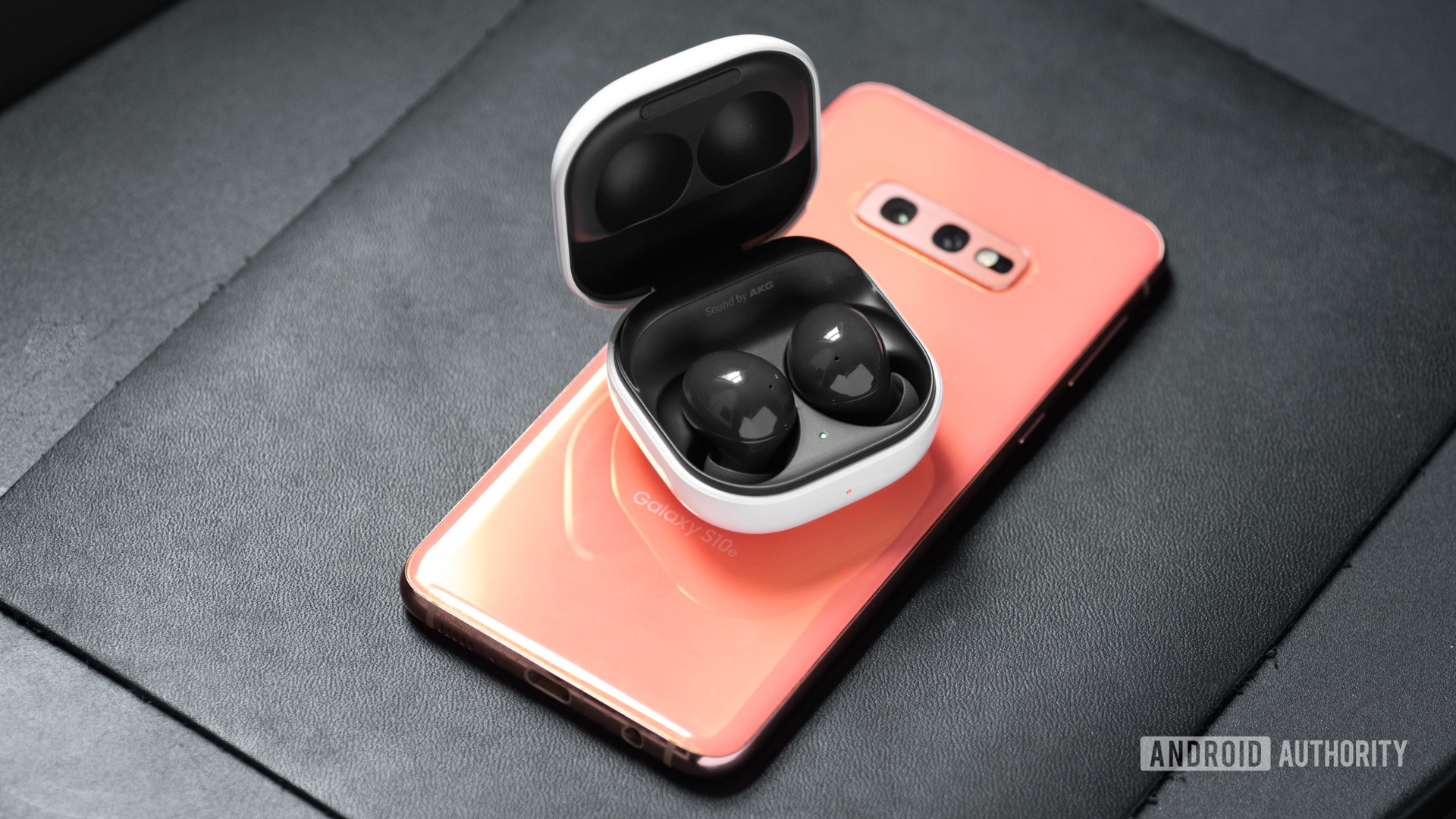
Lily Katz / Android Authority
High switching costs have made it increasingly difficult to jump from one platform to the other. The Apple AirPods (3rd generation) build on the company’s dominance in the true wireless earbuds market by introducing more features limited to Apple devices. Similarly, Samsung has locked the software features of the Samsung Galaxy Buds 2 behind an app that is only available on Android devices.
Even with these platform limitations in mind, Samsung and Apple users may be peering over the walls of their garden to see what the other side has to offer. In this head-to-head, we’ll be comparing the Samsung Galaxy Buds 2 and Apple AirPods (3rd gen) to see if either is worth jumping ship for.
Our verdict: Samsung Galaxy Buds 2 review | Apple AirPods (3rd gen) review
About this Vs: This article comes from the audio experts at our sister site SoundGuys. Check out their in-depth take on the Samsung Galaxy Buds 2 vs Apple AirPods (3rd gen).
Samsung Galaxy Buds 2 vs Apple AirPods (3rd gen)
Design and fit

Chase Bernath / Android Authority
The Galaxy Buds 2 offer a relatively standard true wireless earbud fit and feel. Multiple sizes of silicone ear tips ensure most will attain a secure fit with a good seal. Small and rounded, each earbud features touch-sensitive panels to control music playback and calls.
See also: Ultimate headphone buying guide
On the other hand, the Apple AirPods retain the same unsealed design of previous generations. Many will struggle to attain a proper fit with this one-size-fits-all approach that doesn’t feature swappable ear tips. A slightly more rounded shape compared to previous AirPods offers a better fit in your outer ear, with a slightly worse fit in the ear canal opening. Like the AirPods Pro, indentations in each stem control music playback and Siri.
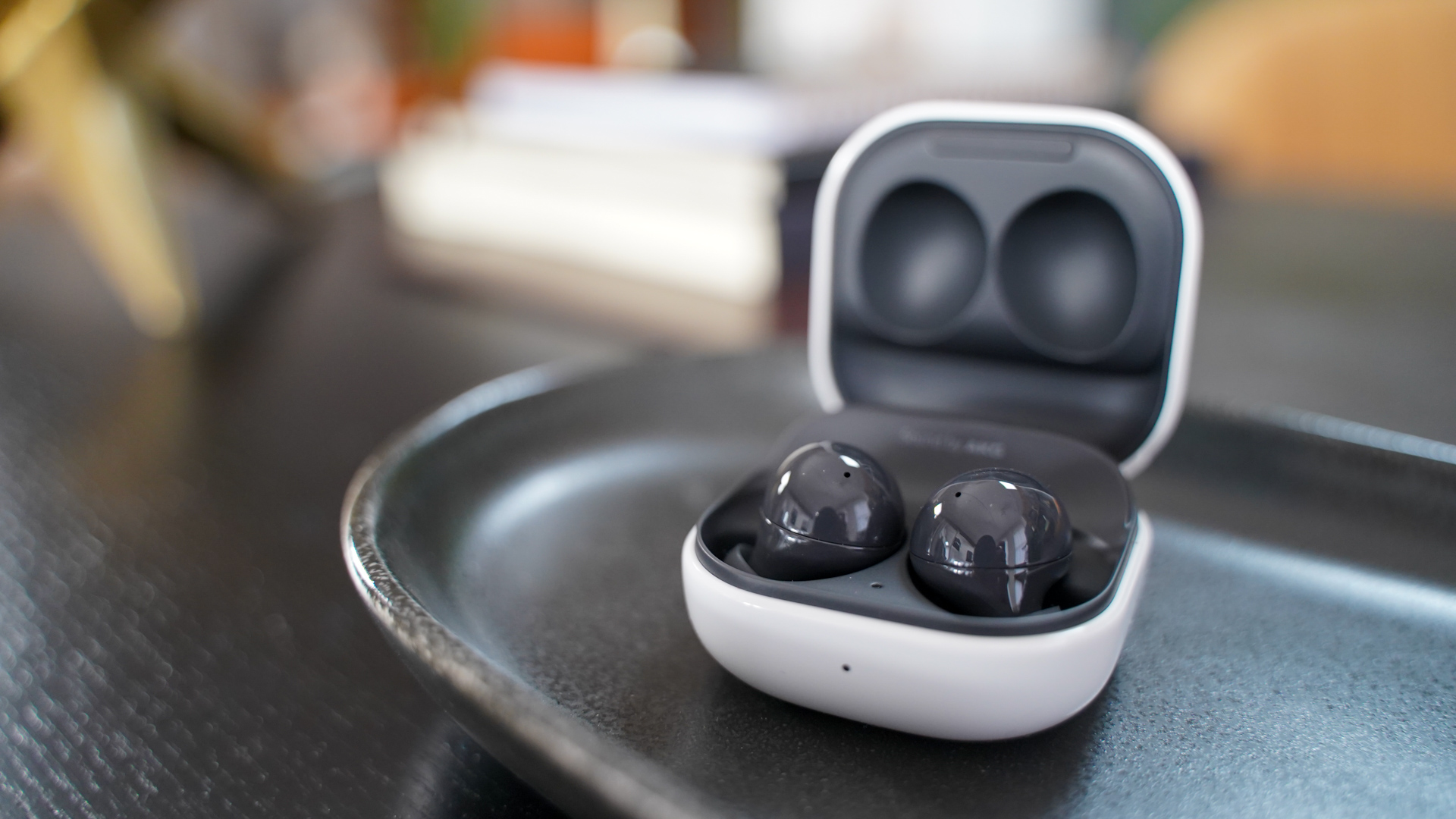
Eric Zeman / Android Authority
Connecting to the Samsung Galaxy Wearable app offers an ear tip fit test and active noise-cancelling (ANC) controls for the Galaxy Buds 2. The AirPods don’t have ANC, but do feature spatial audio. This brings virtual surround sound, meaning the earbuds can playback media mastered for Dolby Atmos. A “spatialize stereo” setting can also convert non-Atmos media into virtual surround sound, though it doesn’t work as well as music made specifically for it. Accelerometers incorporated into the AirPods also allow for head tracking, which keeps the sound source seemingly locked in one place.
IP water protection ratings allow you to use either set of earbuds for working out. An IPX2 rating protects the Galaxy Buds 2 from sweat, while an IPX4 rating protects the AirPods from light splashes of water. The unsealed design of the AirPods makes them a good choice for hearing surroundings while out on a run, while the sealed fit and ANC of the Galaxy Buds 2 are better for blocking out noise in the gym.
Connection
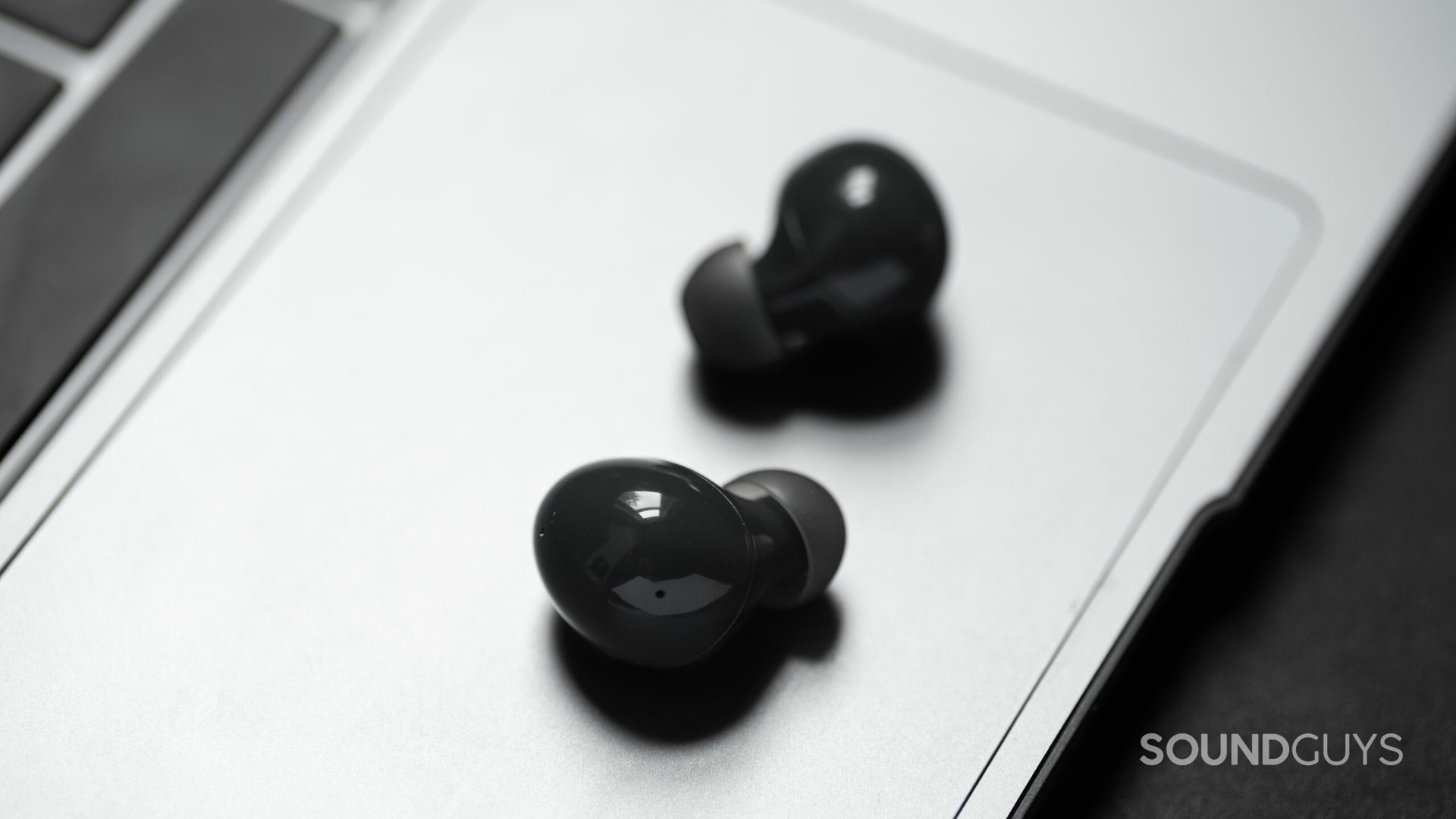
Chase Bernath / Android Authority
Samsung has a slight edge when it comes to connection quality. On top of SBC and AAC, the Galaxy Buds 2 support the Samsung Scalable Codec for optimal connection to Samsung devices. This codec constantly balances between sound quality and connection strength to ensure you get the best listening experience.
The Apple AirPods only support SBC and AAC since these are the only Bluetooth codecs Apple devices use. AAC is much more reliable on Apple devices than Android devices, so iPhone users won’t have to worry about connection strength.
See also: Bluetooth codecs 101 — everything you need to know
The Galaxy Buds 2 also use Bluetooth 5.2, a step up from the Bluetooth 5.0 on the AirPods. The newer iteration of Bluetooth handles the power draw of Bluetooth connections a little more efficiently at greater ranges. Bluetooth 5.2 also means that the Galaxy Buds 2 may one day support the new LC3 codec when it eventually replaces SBC as the default Bluetooth codec.
Software
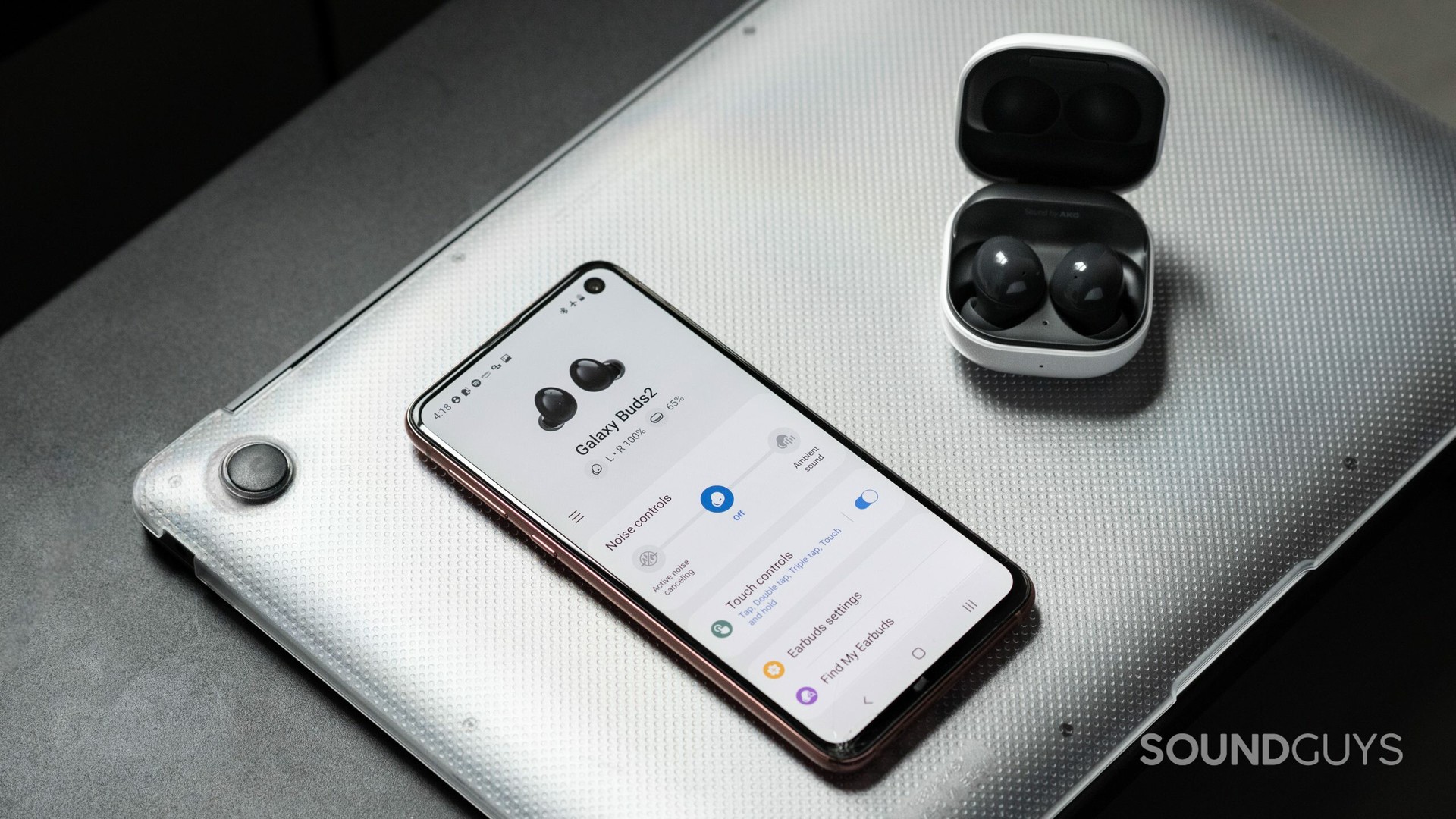
Chase Bernath / Android Authority
Just like the previous Apple AirPods, the AirPods uses the iOS (or iPadOS) settings app for control and customization. Only users that own an Apple device can install firmware updates or use spatial audio, Find My AirPods, and hands-free Siri. The settings app also enables users to adjust the onboard stem controls or toggle automatic ear detection.
Samsung takes a more traditional approach to earbud customization with the Galaxy Wearable app. Since the app is only available on Android, iPhone users miss out on firmware updates as well as toggling between ANC and ambient sound mode, access to the ear tip fit test, and the app’s selection of EQ presets. The Galaxy Buds 2 don’t have a fully custom EQ, but the presets still provide more sound customization than the hands-off Adaptive EQ on the AirPods.
Battery
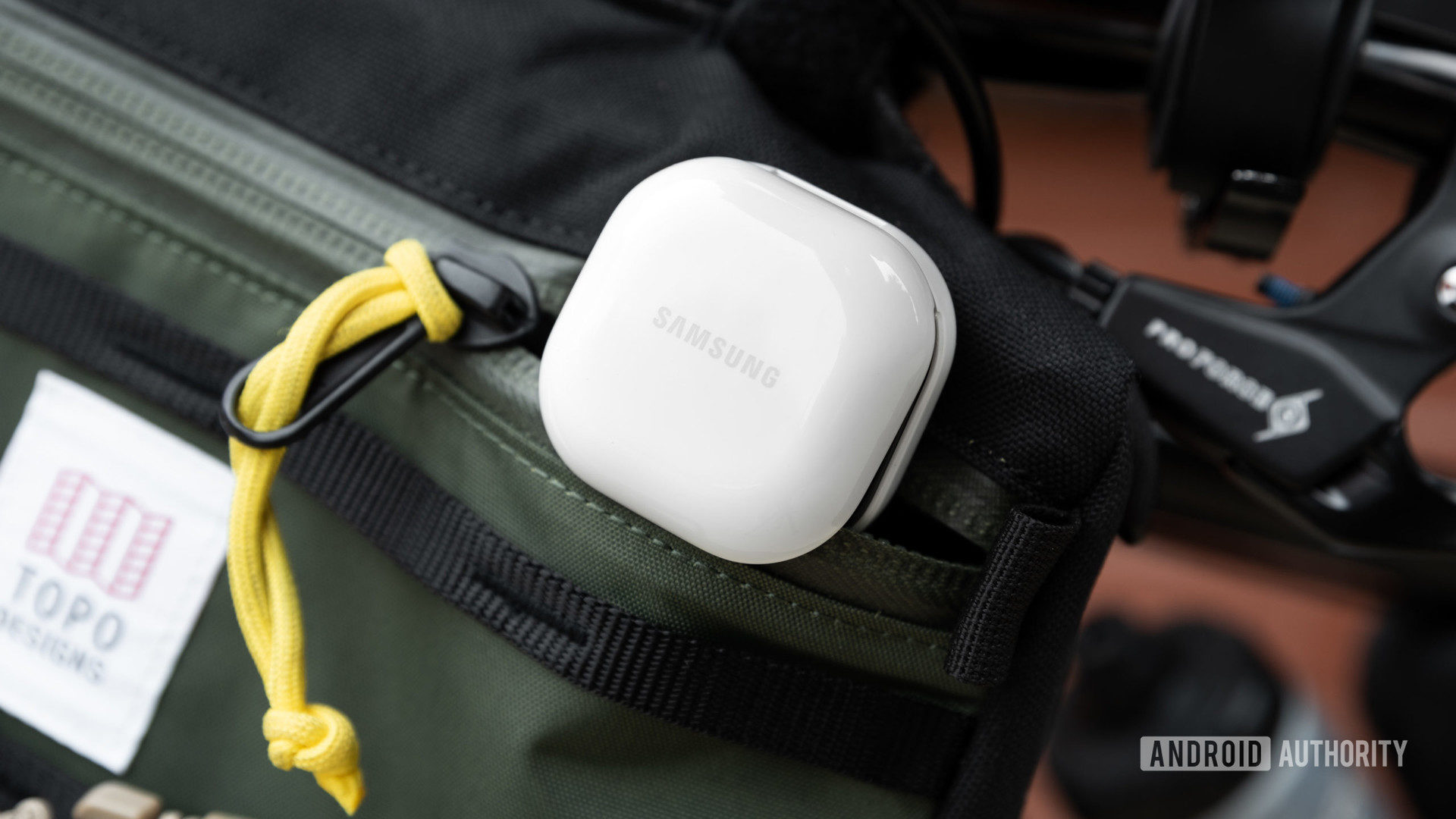
Lily Katz / Android Authority
With a slight boost over its predecessors, the AirPods hold a leg up over the Galaxy Buds 2 when it comes to battery life. In our testing of continuous playback at 75dB(SPL), the AirPods lasted six hours, 21 minutes on a single charge while the Galaxy Buds 2 only lasted five hours and nine minutes. The Galaxy Buds 2 were tested with ANC on, but you might be able to extend their lifespan beyond that of the AirPods by turning ANC off.
The AirPods charging case holds an additional four charge cycles, and can be powered with the new MagSafe charger. You can also charge up the AirPods case with a regular wireless charger or Lightning cable. With five minutes in the charging case, the earbuds attain an hour of playback time.
See also: How to maximize device battery life
The Galaxy Buds 2 charging case holds an additional three charge cycles, for just over 20 hours of cumulative playback. USB-C or wireless charging powers up the case, which in turn can also provide an hour of playback to the earbuds from only five minutes of charging. If you have a compatible Samsung Galaxy device, you place the case on top of the device to wirelessly charge the case and earbuds.
Sound quality
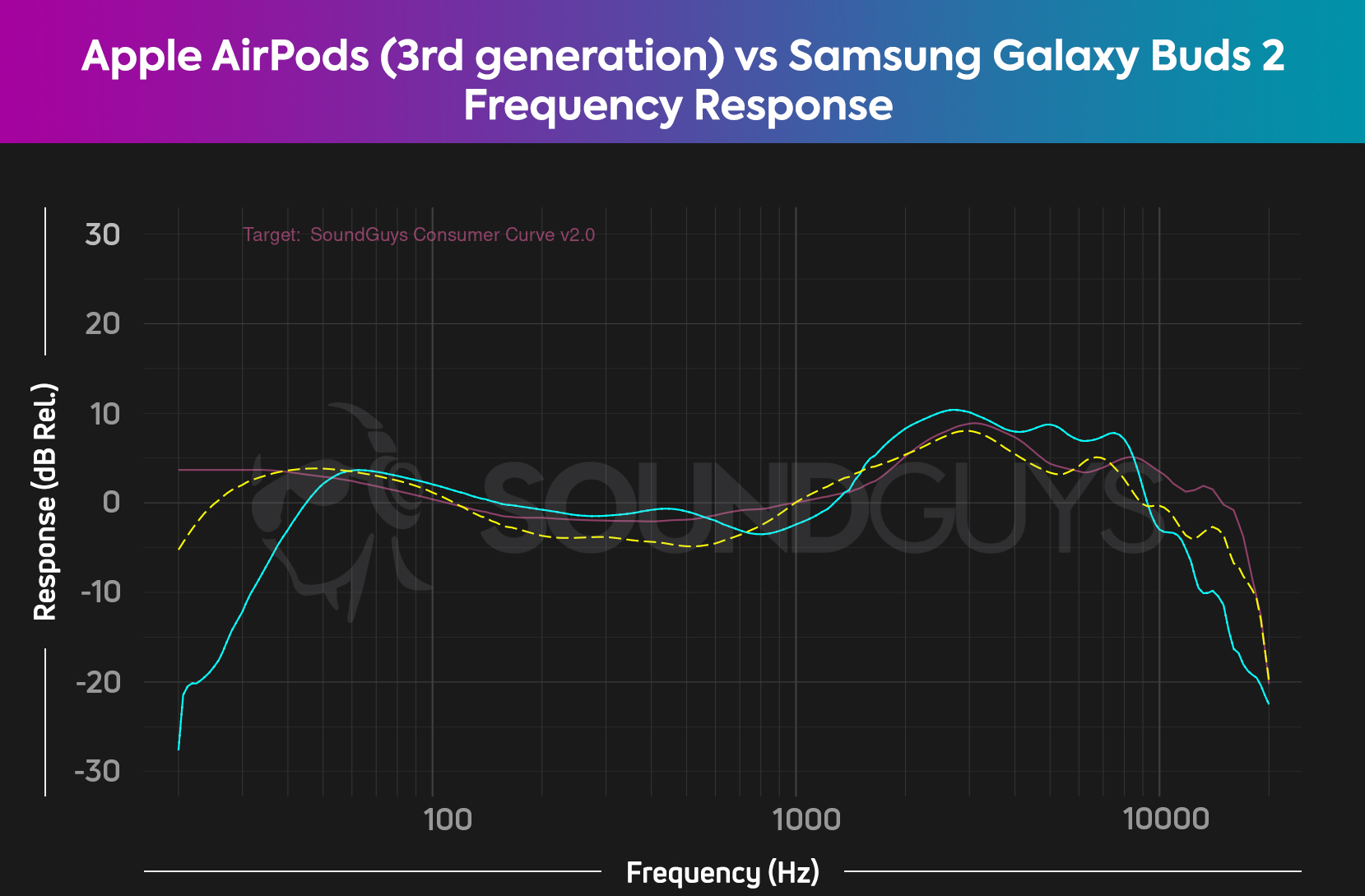
Chase Bernath / Android Authority
If you are listening in a quiet environment, the AirPods and Samsung Galaxy Buds 2 sound pretty similar. In the frequency chart above, the AirPods are in cyan, the Samsung Galaxy Buds 2 is the yellow dashed line, and the SoundGuys Consumer Curve is the pink line. The silicone ear tips on the Galaxy Buds 2 enable far more accurate sub-bass output, though the AirPods integrated bass reflex ports do a lot to mitigate bass leaking.
Midrange output is slightly more accurate on the AirPods. Combined with the slight boost in high frequencies, this leads to more perceived clarity in vocals and instruments such as guitars and pianos. In general, either of these earbuds will sound great for just about any kind of music.
Isolation and noise-cancelling
While both sets of earbuds sound good in quiet environments, only one performs well in noisy environments. Due to the unsealed fit of the AirPods, pretty much all environmental noise leaks into your music. Auditory masking will force you to turn up your music in loud environments, putting your ears at risk of harm.
The Galaxy Buds 2, on the other hand, can make low-frequency noises sound one-quarter as loud as they would without the ANC earbuds. This is pretty impressive, and requires you to get a solid seal with the ‘buds to your ears.
Microphone
Both earbuds have adequate onboard microphones, though the AirPods often sound better — depending on what device you use them with. With pretty much every pair of AirPods we’ve reviewed, microphone quality takes a hit when paired with Android devices or different computers. The Samsung Galaxy Buds 2 don’t sound quite as good but should be more consistent across platforms.
Apple AirPods (3rd generation) mic sample:
Samsung Galaxy Buds 2 mic sample:
Samsung Galaxy Buds 2 vs Apple AirPods (3rd gen): The verdict
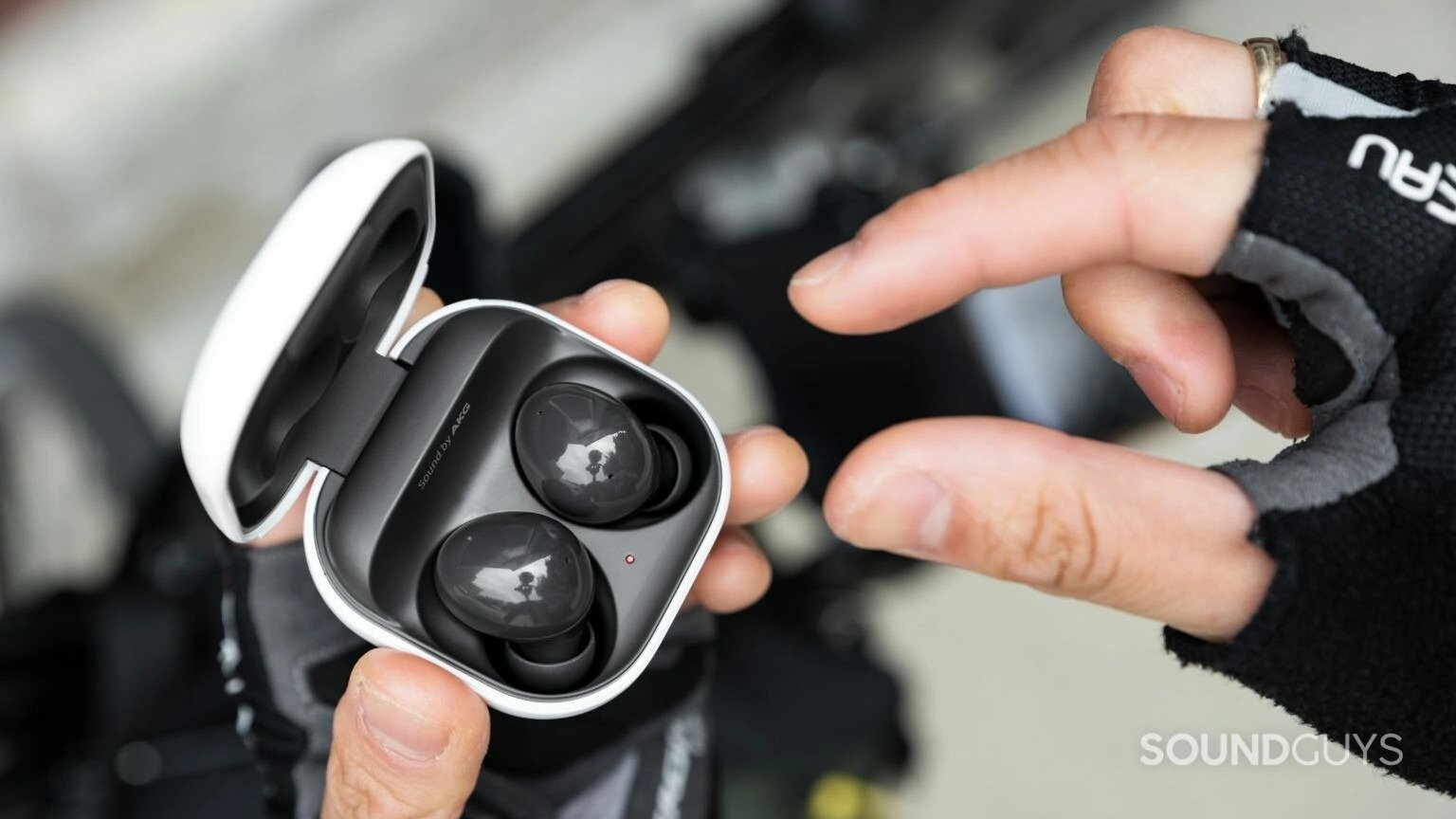
Chase Bernath / Android Authority
While you can use either set of earbuds on either platform, you will substantially limit your experience out of the gate when you choose the headset beyond your ecosystem. iPhone owners can utilize the Apple AirPods software integration and a host of additional features, while the Galaxy Wearable app isn’t even available to iOS users. Android users (and especially Samsung users) can enjoy all that the Samsung Galaxy Buds 2 have to offer, but won’t get much out of the AirPods.
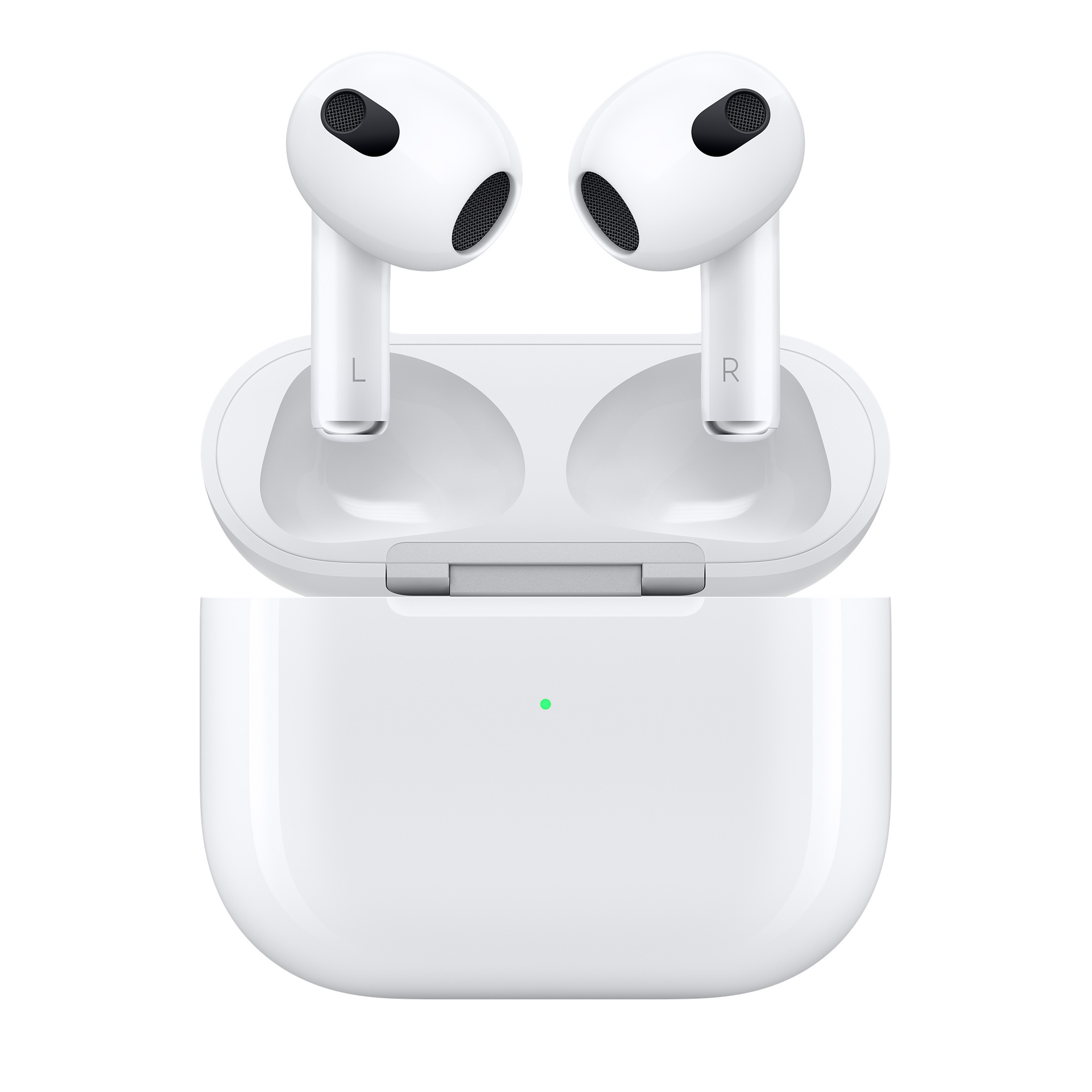
Apple AirPods (3rd generation)
The third generation of Apple's true wireless earbuds.
A new design brings water resistance, spatial audio, and longer battery life to the world's most popular earbuds.
Either set of earbuds brings a host of features, though the shortcomings of the AirPods unsealed design is hard to overlook. People doing exercises that require a secure fit should definitely look at the Galaxy Buds 2 for its more versatile design that brings ANC, an ear tip fit test, and a variety of EQ presets.
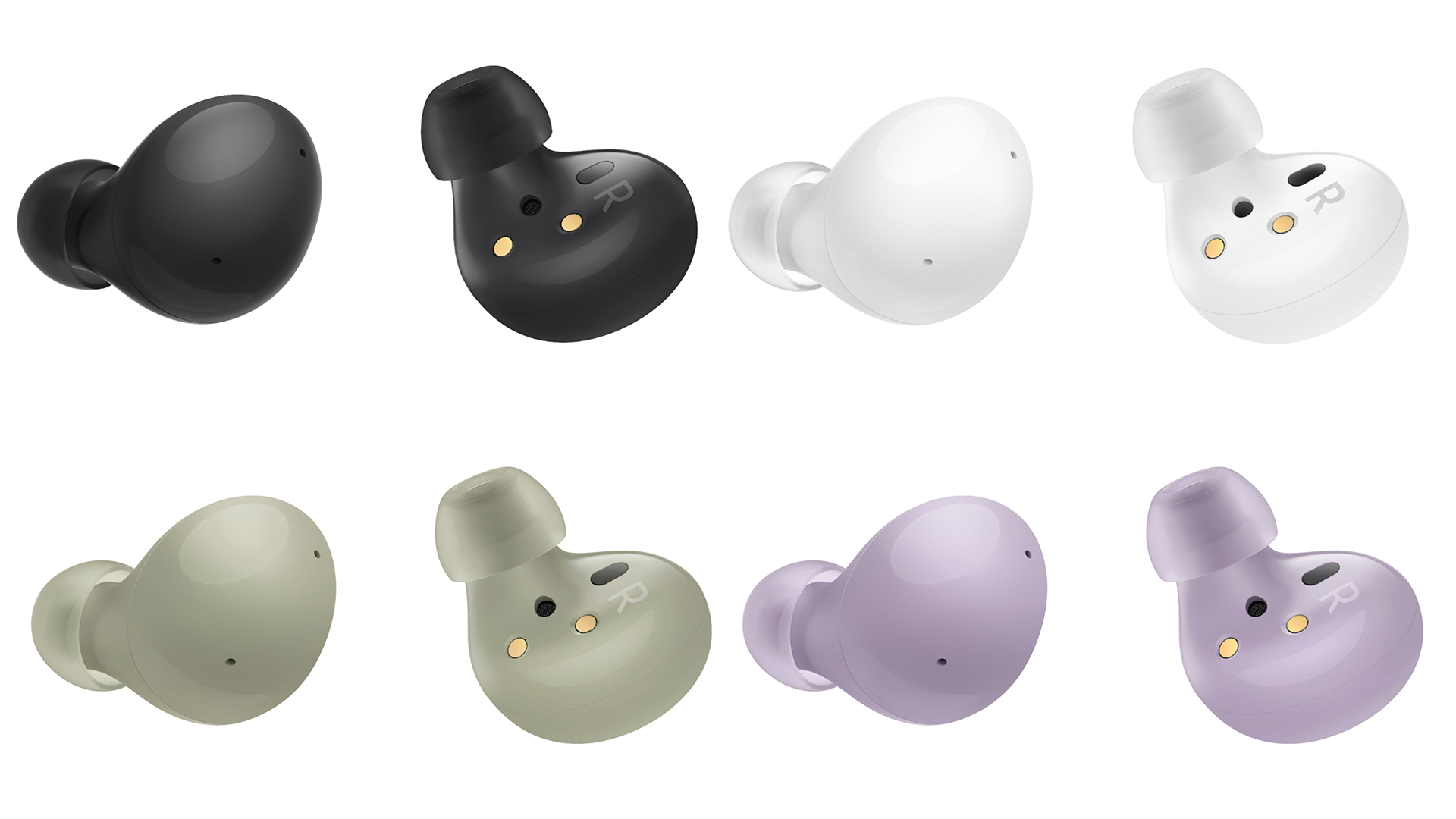
Samsung Galaxy Buds 2
Small noise-cancelling earbuds for daily use.
A more affordable pair of noise-cancelling earbuds from Samsung, with an IPX2 water-resistant build and compact, lightweight design. There's a lot to love with these playful earphones.
Alternatives
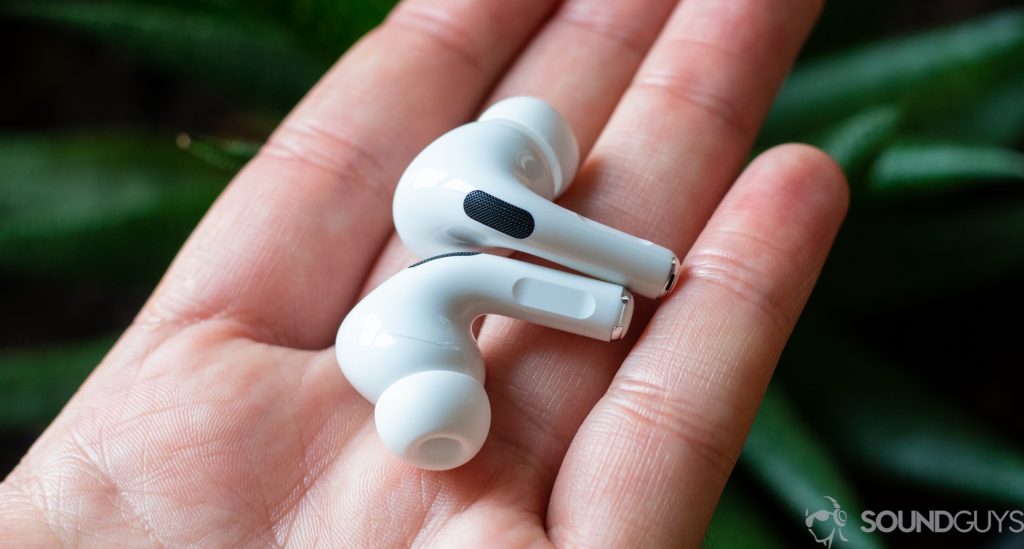
Chase Bernath / Android Authority
Luckily, these earbuds aren’t the only option for iOS and Android users. Apple device owners are much better off with the Apple AirPods Pro, which alleviates the major shortcomings of the regular AirPods by adding silicone ear tips and ANC.
The Beats Studio Buds and Beats Fit Pro are also worth a look, with active noise-cancelling, fast charging, an IPX4 rating, and a tight fit. Android users can take advantage of all the Beats earbuds have to offer by downloading the Beats app from the Google Play Store.
The Sennheiser CX Plus True Wireless bring a lot of the same features as the Galaxy Buds 2, but they also offer aptX support, so more than just Samsung users get a premium Bluetooth codec. If you don’t care about ANC, you could also go for the cheaper Sennheiser CX True Wireless, which are otherwise identical.
Samsung Galaxy Buds 2 vs Apple AirPods (3rd generation): Platform face-off - nation.lk - The Nation Newspaper
Read More

No comments:
Post a Comment